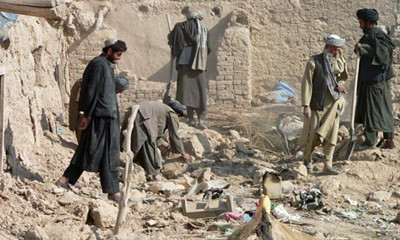The U.S. military acknowledged Saturday that 37 civilians were killed and 35 injured during fighting last week in Kandahar province between insurgents and coalition forces.

REDUCED TO RUBBLE: Men in a village outside Kandahar examine a wrecked house that Afghan officials say was hit by a U.S. airstrike last week during a wedding party. (Humayoun Shiab / EPA) November 5, 2008
Although the American statement stopped short of taking direct blame for civilian casualties in a southern province that is one of the country's most active battlefields, it demonstrated an unusually swift public response to claims of mass casualties made by Afghan officials.
The finding came just three days after provincial officials and the Afghan president's office asserted that three dozen people had died in an errant U.S. airstrike on a wedding party in a village outside the city of Kandahar.
The city, the main population center in Afghanistan's south, was the onetime stronghold of the Taliban. Militants and coalition forces clash almost daily in surrounding Kandahar province, which is a center of Afghanistan's drug trade.
The new head of the U.S. Central Command, Army Gen. David H. Petraeus, responsible for American forces across the Middle East, was in Afghanistan last week to look at ways to revamp the Western military strategy in the wake of a dramatic resurgence by Taliban-led militants over the last two years. During his visit, Afghan defense officials told him that civilian casualties were sharply eroding public support for the presence of foreign forces.
The deaths and injuries of noncombatants also have become an extremely sensitive issue between the U.S.-backed government of President Hamid Karzai and Western forces.
On Wednesday, hours after Sen. Barack Obama won the U.S. presidential election, Karzai used what was to have been a congratulatory news conference to plead with the president-elect for an end to civilian fatalities.
The investigation of the deaths in Wech Bagtu village was carried out by Afghan officials, the Afghan army and the U.S.-led coalition, the American military said in the statement. That is a departure from the days when U.S. officials were sometimes reluctant to involve Afghan authorities in such inquiries, though such cooperation has become more common.
In releasing the findings, the U.S. military emphasized that during the battle Monday militants used villagers' homes for cover.
"Village elders told the joint investigation team that insurgentswho were not from their village . . . fired at [Afghan] and coalition forces," the statement said. Residents were prevented from leaving the area during the battle, it said.
The military did not directly acknowledge that it inadvertently bombed the wedding party, but said coalition forces used "close air support to suppress enemy fire."
Compensation was paid to the families of the dead and injured, the military said without providing details.
The prompt investigation and findings stood in sharp contrast to some recent high-profile cases involving civilian casualties. Afghans were infuriated when the Americans took weeks to investigate claims by the Afghan government and the United Nations that 90 people, most of them women and children, were killed in an Aug. 22 airstrike in the western province of Herat.
After initially saying that five civilians were killed, a U.S. investigation concluded that 33 civilians had died. But that finding was made six weeks after the airstrike, and the high-level investigation was launched only after videos surfaced that appeared to show large numbers of civilian dead.
"Civilians getting caught in the crossfire is the worst possible thing that could happen," U.S. Army Col. Gregory Julian said of last week's deaths in Kandahar. "We regret this tragic loss of innocent lives."
Afghan weddings are traditionally large, drawn-out affairs, and wedding parties several times have been the target of errant airstrikes, in part because from the air the gatherings can appear similar to concentrations of Taliban fighters.
In Afghanistan's clan-based society, civilian deaths can cause otherwise peaceable villagers to declare a vendetta against those they consider responsible for killing their kin -- in many cases, Western forces.
More than 1,200 civilians have been killed this year. A majority of the deaths were caused by insurgent attacks such as suicide bombings, but human rights groups and Afghan officials say hundreds have died at the hands of foreign forces during fighting with the Taliban and other militant groups.



